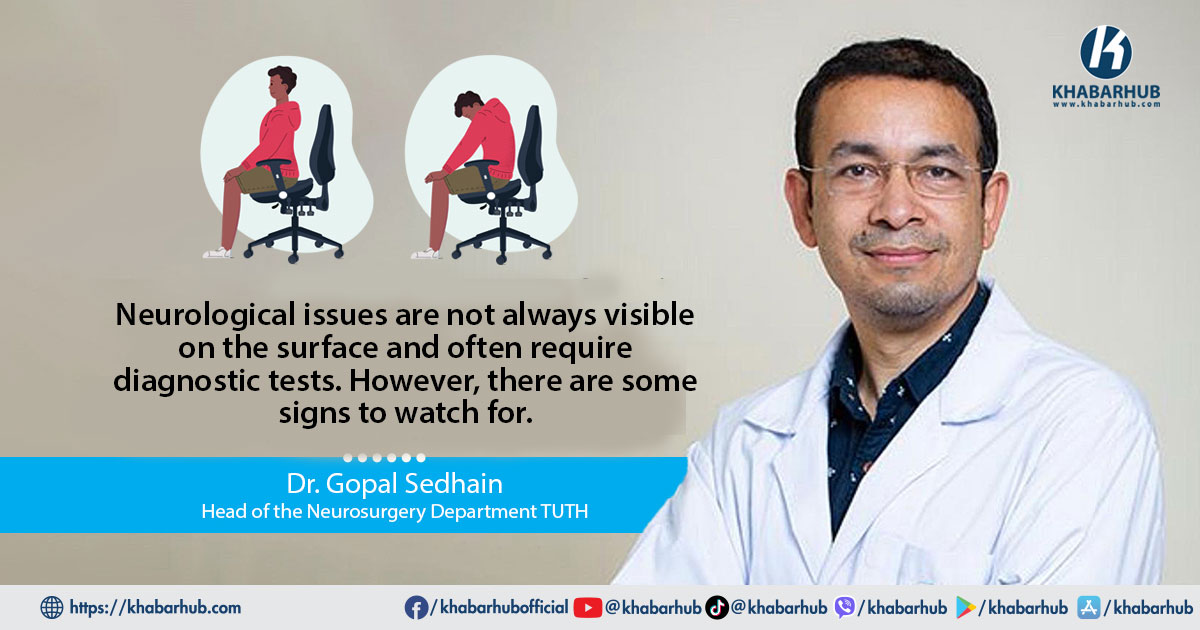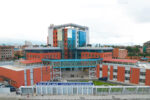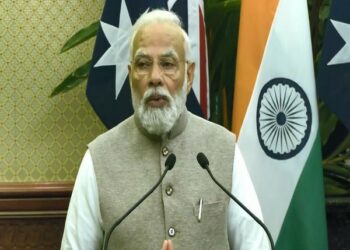KATHMANDU: Neurological non-communicable diseases—like cancer, kidney disease, diabetes, and hypertension—are increasing globally.
According to doctors, neuro-related conditions now affect people of all age groups, from children to the elderly, largely due to changes in diet and lifestyle.
While the incidence of neurological diseases is on the rise, advancements in medical technology have made treatment more accessible and effective.
So, what is the current status of neurosurgery in Nepal? How aware are people about it? And what can be done to prevent neurological complications? We spoke with Dr. Gopal Sedhain, Head of the Neurosurgery Department, Tribhuvan University Teaching Hospital, to understand the current landscape. Excerpts:
What is the current status of neurosurgery in Nepal?
We now have 116 neurosurgeons affiliated with the Nepalese Society of Neurosurgeons. While neurosurgery services were once concentrated in Kathmandu, they’ve expanded significantly.
Today, you can find services stretching from Birtamod in the east to Dhangadhi in the west. Complex procedures, including wire-guided surgeries and others, are being conducted successfully across the country.
These days, it’s no longer necessary for patients to travel abroad for neurosurgical treatment due to lack of facilities in Nepal. People may still choose to go abroad if they prefer, but the compulsion is no longer there.
In fact, patients from border areas of India are now coming to Nepal for treatment, which speaks volumes about our growing capacity.
Neurology is a broad field, which often confuses patients. Which cases should be seen by a neurosurgeon?
Neurological issues fall into four major categories. First, there are congenital conditions. For example, hydrocephalus—an abnormal buildup of fluid in the brain—or spinal defects, such as a lump on the back. These cases should be handled by neurosurgeons.
Second, we treat brain and spinal tumors. Some tumors may only require a biopsy, while others need complex surgical intervention.
Third is trauma. Injuries that lead to swelling or bleeding in the brain can worsen if not treated promptly, so it’s best to consult a neurosurgeon early.
Fourth are age-related conditions. While degenerative brain conditions like Alzheimer’s fall under neurology, issues like spinal disc degeneration are often treated by neurosurgeons.
While there are also spine surgeons, every neurosurgeon is trained in spine surgery. So, in such cases too, consulting a neurosurgeon is appropriate.
Unfortunately, there’s a misconception that visiting a neurosurgeon automatically means surgery. That’s not true. Surgeons only operate when necessary.
Many patients first go to a neurologist or physiotherapist and reach the neurosurgeon too late—by then, the outcomes may not be as favorable. Early consultation is key, especially for congenital issues, tumors, head injuries, vascular problems, and paralysis.
Some other cases come later in the process, like epilepsy. If it’s caused by a tumor or doesn’t respond to medication, a neurosurgeon may step in.
Similarly, in Parkinson’s disease, if medications stop being effective, surgical options are considered. Neurosurgery is a vast and evolving field.
How aware are people in Nepal about neurosurgery?
Awareness has significantly improved. Today, people understand that neurosurgery can help them live normal, healthy lives. In the past, there was widespread fear that neurosurgery would lead to paralysis or death.
But now, thanks to advancements in technology, skilled surgeons, and patients seeking help in time, people are realizing that neurosurgery is a safe and successful treatment option.
We’ve made progress, but some misconceptions persist—particularly about spinal surgery. Many believe it inevitably causes paralysis or that physiotherapy alone is enough.
While physiotherapy is important, it’s not a substitute for surgery when it’s clearly indicated. We are encouraging physiotherapists to refer such patients promptly, because delays can worsen outcomes.
Raising public awareness and timely intervention remain crucial in improving the prognosis of neurological diseases.
What age group is most likely to require neurosurgery?
Children often need surgery due to congenital (birth-related) conditions, while adults are more prone to surgical needs from injuries. Paralysis, in particular, is most common among individuals aged 40 to 60, as the likelihood increases with age.
However, when paralysis occurs in older adults, some patients tend to discontinue treatment. As a result, the group that most frequently seeks treatment consists of younger and middle-aged adults.
Conditions like tumors, spinal cord issues, and brain swelling seen in children also contribute to the complexity of cases.
How can one know if they have a neurological problem? What symptoms should they look for?
Neurological issues are not always visible on the surface and often require diagnostic tests. However, there are some signs to watch for.
For instance, if a person with epilepsy is taking two medications with little or no effect, and a third drug is needed, it’s advisable to consult a neurosurgeon.
Similarly, if a leg suddenly stops functioning due to a spinal issue or if a limb becomes paralyzed due to a neck injury, one should see a neurosurgeon immediately. Chronic headaches also create confusion—many don’t know whether to consult a physician or a surgeon.
Currently, Nepal has only about 35–36 neurophysicians compared to around 120 neurosurgeons. Ideally, one should see a neurophysician first.
But in the absence of one, consulting a neurosurgeon is appropriate. Surgeons are also trained to perform assessments and refer patients as needed.
Neurosurgery is considered very expensive. What’s the current reality?
Yes, neurosurgery is relatively costly, largely due to the advanced equipment required to ensure safety and precision. For example, a surgical microscope can cost up to NPR 5 million, and a drill may cost NPR 6 million.
The use of ICUs, imaging, and other advanced technologies further increases the overall treatment cost.
The government has made some neurological medicines available free of charge. How helpful has that been?
The government has prioritized two neurological conditions under its serious disease program: paralysis and severe headaches. Patients receive up to NPR 100,000 in support for treatment.
This has made a difference—especially for paralysis treatment. One particular medication, previously unaffordable for many, costs between NPR 50,000 to 100,000 per dose.
If this is administered within 4.5 hours of stroke onset, it can significantly reduce the chances of death and long-term disability.
Previously, patients had to purchase this medicine themselves upon arriving at the emergency room. But now, with government provision, it is immediately accessible—potentially saving many lives. This is a commendable step by the government.
Health Minister Pradeep Poudel has also appointed me as the coordinator to establish a National Neuro Center. We’re currently preparing a blueprint for submission.
The government’s support gives us hope that neuro-related treatments will become even more accessible in the future.
Which hospitals in Nepal offer accessible neurosurgery services?
Many hospitals across Nepal now provide neurosurgical services. Specialized centers include Bansbari Neuro Hospital and Annapurna Neuro Hospital.
Additionally, several government and private hospitals in the Kathmandu Valley offer effective neurosurgical care, such as: Tribhuvan University Teaching Hospital, National Trauma Center (Bir Hospital), Nepal Medical College, Kathmandu Medical College, KIST Medical College, and Norvic International Hospital.
What is the overall status of neuro-related diseases across Nepal?
Injury-related cases form a large portion of neurosurgical admissions. Road accidents remain a major cause, although the situation has slightly improved in the Kathmandu Valley, likely due to stricter alcohol regulations.
However, in hilly regions, daily incidents like vehicle accidents and falls from cliffs or trees are common.
Service availability is uneven across the country. Because neurosurgery relies heavily on advanced technology, expanding services to remote and hilly areas remains a significant challenge.
While we lack comprehensive national data on how many patients require neurosurgery, statistics show a growing trend in neurological disorders.
Currently, neurological conditions rank fourth among non-communicable diseases in Nepal. Around 15% of paralysis cases and physical disabilities are linked to neurological problems.
How can neurological problems be prevented?
The most important factor is injury prevention. For example, wearing a helmet while riding a motorcycle is essential to prevent head injuries, and riding at a safe speed is equally important.
To reduce the risk of paralysis, maintaining a healthy lifestyle is key—this includes avoiding alcohol, smoking, and tobacco products, as well as keeping cholesterol levels under control.
Another major concern is spinal cord defects in newborns, often caused by folic acid deficiency during early pregnancy. In Nepal, folic acid is typically taken only after pregnancy is confirmed, but that’s often too late for preventing neurological issues.
The neural tube, which later develops into the brain and spinal cord, forms within the first 3 to 4 weeks of pregnancy—often before a woman even realizes she’s pregnant. It usually takes about 6 weeks to confirm pregnancy.
Therefore, women planning to conceive should start taking folic acid in advance to protect their future children from neurological disorders.
To address this, the government has started fortifying staple foods like rice and flour with folic acid. This helps those who purchase their food, but those who grow their own food still face limited access.
In addition, pregnant women should be protected from trauma or injury. By focusing on these three key areas—injury prevention, folic acid intake, and maternal safety—many neurological problems can be prevented.
What should be done after neurosurgery?
Post-surgical rehabilitation is crucial. Unfortunately, this area is often neglected in Nepal. If a national neuro center is established, it must include at least 10 dedicated rehabilitation beds to ensure patients recover properly.
Currently, at the Tribhuvan University Teaching Hospital alone, there are 7–8 patients who are medically ready for discharge but require rehabilitation.
Due to the lack of government-run rehab centers, they occupy hospital beds, limiting access for new patients. Private rehab centers exist but are expensive.
Most facilities only offer physiotherapy, which focuses on physical exercises but not full rehabilitation. Proper rehabilitation requires trained therapists, many of whom are available but underutilized.
Thus, developing rehabilitation infrastructure and services should be a top priority.
Do patients need to take medication for life after neurosurgery?
In some cases—especially for spinal disorders—patients may need long-term or even lifelong medication. For some, medication is necessary for a minimum of two years; others may require it for five years or more. The duration depends on the nature and progression of the condition.
How do work habits contribute to neurological issues?
Due to modern work habits and sedentary lifestyles, neurological issues that were previously seen in people in their 60s are now emerging in those as young as their 30s.
In the past, people engaged in active physical work like farming, which kept their bodies moving. Now, many people remain in one position for hours, leading to spinal and neck problems.
Jobs involving prolonged sitting, repetitive hand movements, or poor posture contribute to issues like back pain, neck strain, and even finger-related problems. Many young professionals working abroad come back with such complications.
We always advise: avoid working in the same position for too long—but most people only start to take it seriously after symptoms begin.
As a neurosurgeon, what advice do you have for working professionals?
Pay close attention to your overall health. If you have a desk job, take five-minute breaks to stretch your body regularly. This not only reduces mental stress but also protects your spine and gives your eyes much-needed rest.
Be mindful of your posture, maintain a healthy weight, and follow a balanced diet. Small daily habits can significantly reduce your risk of developing neurological problems later in life.









Comment